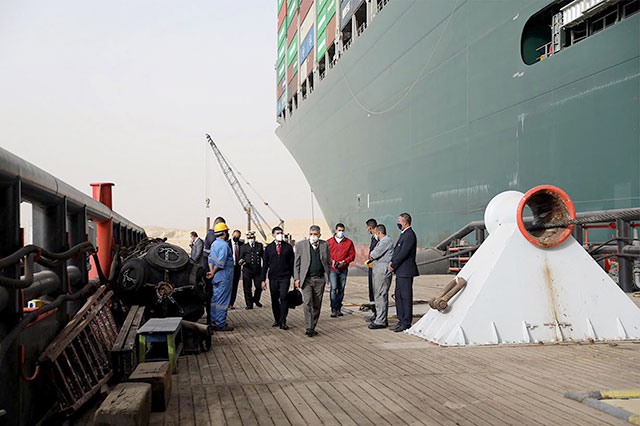CAIRO — The owners of a giant container vessel blocking the Suez Canal said on Thursday they were facing "extreme difficulty" refloating it, prompting Egypt to suspend navigation through one of the world's busiest shipping lanes. Shipping analysts warned the suspension could last days or even weeks, forcing businesses to consider diverting their cargos to the much longer route round the tip of Africa in a blow to global supply networks.
The Suez Canal Authority (SCA) said it was doing all it could to refloat the Panama-flagged MV Ever Given, a 400-metre-long vessel which veered off course and ran aground in a sandstorm on Tuesday.
Satellite pictures released by Planet Labs Inc show the 59-metre wide container ship wedged diagonally across the entire canal.
Japanese ship-leasing firm Shoei Kisen Kaisha said it owned the giant vessel and was facing "extreme difficulty" trying to refloat it.
"In co-operation with local authorities and Bernhard Schulte Shipmanagement, a vessel management company, we are trying to refloat (the ship), but we are facing extreme difficulty," Shoei Kisen Kaisha said in a statement on its website.
"We sincerely apologise for causing a great deal of worry to ships in the Suez Canal and those planning to go through the canal."
As shipping specialists warned it could take weeks to budge the vessel, the Suez Canal Authority announced it was "temporarily suspending navigation".
Maritime sources said on Thursday that a new dredger had been deployed to speed up the operation while northern convoy ships remain docked in the waiting areas of the canal.
"We've never seen anything like it before," said Ranjith Raja, Middle East oil and shipping researcher at international financial data firm Refinitiv.
"It is likely that the congestion... will take several days or weeks to sort out as it will have a knock-on effect on other convoys."
'Beached whale'
A team from Dutch firm Smit Salvage is due to arrive in the canal zone on Thursday, said Peter Berdowski, CEO of its parent company Boskalis.
When asked about the challenges of moving the vessel, Berdowski told the Dutch TV news programme Nieuwsuur: "It's really a heavy whale on the beach, so to speak."
The blockage has already hit world oil markets. Crude futures surged six per cent on Wednesday as traders assessed the likely impact on deliveries.
Broker Braemar warned that if tug boats are unable to move the giant vessel, some of its cargo might have to be removed by crane barge to refloat it.
"This can take days, maybe weeks," it said.
Canal traffic has been disrupted several times in the past, notably during the Arab-Israeli wars of the second half of the 20th century.
It was closed for six months after Egypt nationalised the canal operating company in 1956 prompting an abortive invasion by Britain, France and Israel.
During the Six-Day War of 1967, Egypt imposed a blockade to prevent the canal's use by Israel which lasted until 1975.
More recently, in 2018 the canal was temporarily closed after a Greek-owned bulk carrier suffered engine failure, triggering a five-ship collision.
'Critical' route
The vessel's managers, Singapore-based Bernhard Schulte Shipmanagement (BSM), said its 25 crew were unhurt and the hull and cargo undamaged.
A MarineTraffic map showed large clusters of vessels circling as they waited in both the Mediterranean to the north and the Red Sea to the south.
Historic sections of the canal were reopened in a bid to ease the bottleneck, with dozens of ships waiting at both ends of the waterway.
The waterway drastically shortens travel between Asia and Europe because it prevents vessels from having to navigate around southern Africa's Cape of Good Hope.
The Singapore-to-Rotterdam route, for example, is 6,000 kilometres (3,700 miles) and up to two weeks shorter via the canal than going around Africa.
It is an "absolutely critical" route because "all traffic arriving from Asia goes through the Suez Canal," said Camille Egloff, a maritime transport specialist at Boston Consulting Group.
Nearly 19,000 ships passed through the canal last year carrying more than one billion tonnes of cargo, according to the SCA. Egypt earned $5.61 billion in revenues.
